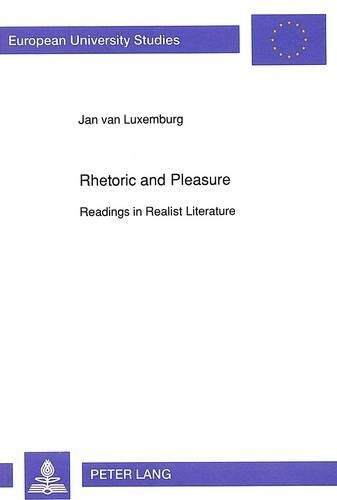Readings Newsletter
Become a Readings Member to make your shopping experience even easier.
Sign in or sign up for free!
You’re not far away from qualifying for FREE standard shipping within Australia
You’ve qualified for FREE standard shipping within Australia
The cart is loading…






This study treats, after a discussion on literary theory, rhetorical and conventional aspects of realist novels from three different cultures: La regenta by the Spaniard Leopoldo Alas (1852-1901), the feminist novel Constance Ring by the Norwegian author Amalie Skram (1846-1905) and three Roman novels by the Dutch writer Louis Couperus (1863-1923). The author argues that part of the meaning of these novels is influenced and in some cases even rendered undecidable by the use of rhetorical figures and tropes or by the exigencies of literary decorum. Part of the rhetoric is strongly estheticizing: it generates a plaisir du texte, and also threatens the postulated serious or emancipatory meaning of the texts. Van Luxemburg’s rhetorical analysis is influenced by the deconstructionist criticism of among others Roland Barthes, J. Hillis Miller, Paul de Man and Adena Rosmarin. His book covers the representation of women, of servants and slaves and (in relation to this) the depiction of morality and religion.
$9.00 standard shipping within Australia
FREE standard shipping within Australia for orders over $100.00
Express & International shipping calculated at checkout
This study treats, after a discussion on literary theory, rhetorical and conventional aspects of realist novels from three different cultures: La regenta by the Spaniard Leopoldo Alas (1852-1901), the feminist novel Constance Ring by the Norwegian author Amalie Skram (1846-1905) and three Roman novels by the Dutch writer Louis Couperus (1863-1923). The author argues that part of the meaning of these novels is influenced and in some cases even rendered undecidable by the use of rhetorical figures and tropes or by the exigencies of literary decorum. Part of the rhetoric is strongly estheticizing: it generates a plaisir du texte, and also threatens the postulated serious or emancipatory meaning of the texts. Van Luxemburg’s rhetorical analysis is influenced by the deconstructionist criticism of among others Roland Barthes, J. Hillis Miller, Paul de Man and Adena Rosmarin. His book covers the representation of women, of servants and slaves and (in relation to this) the depiction of morality and religion.